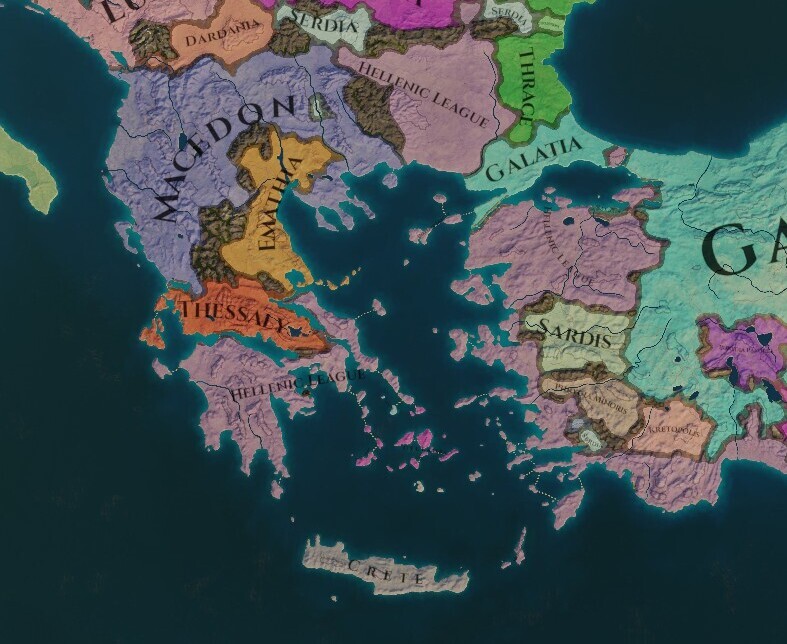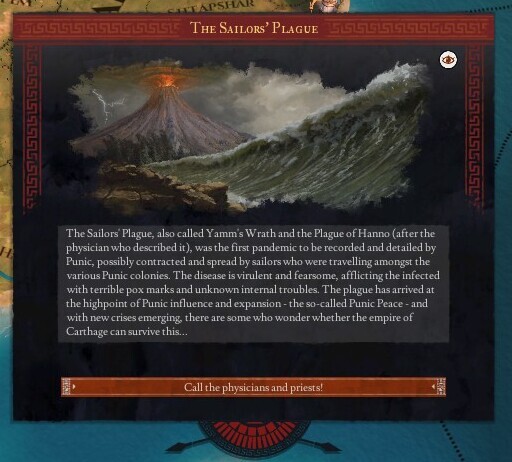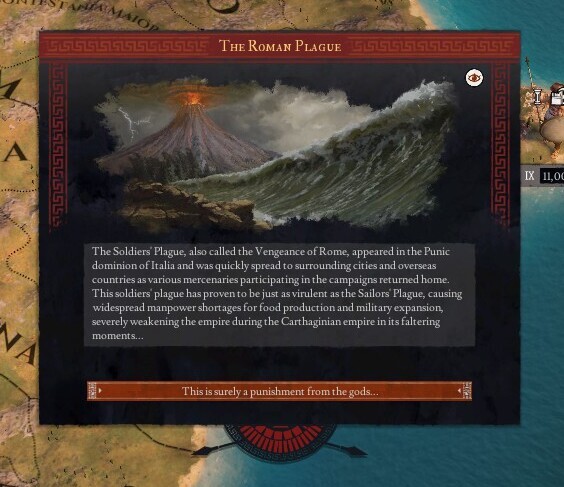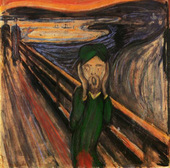|
dervival posted:'simulating the dark ages' is a good euphemism for running down time on these megacampaign games The dark ages happened because the player got bored of governing the entire expanse of the Roman Empire and handed over control of the west to the AI
|
|
|
|

|
| # ? May 26, 2024 02:51 |
|
Quorum posted:The dark ages happened because the player got bored of governing the entire expanse of the Roman Empire and handed over control of the west to the AI This explains quite a bit.
|
|
|
|
It will be interesting to play out the Hunnic invasion with no East and West Romans. Can’t see the isolated Carthaginian city states standing up too well to the horde. Unless they go all Magyar on us and settle across France with no power to hold them back?
|
|
|
eh, after reconsidering i'll probably play through a bit longer than 150 CE - so the next update might be a bit longer than planned, we'll seeWeavered posted:It will be interesting to play out the Hunnic invasion with no East and West Romans. Can’t see the isolated Carthaginian city states standing up too well to the horde. this'll be decided by the thread, sort of. there'll be 3 or 4 major votes --- one will be on barbarian invasions, and while the thread gets to decide which direction they go in, it'll be down to dice rolls to decide the numbers involved and the extent of their victories so while the Huns might go west, their invasions could fizzle out before they reach Hungary, or yeah they might go all the way to France or Iberia
|
|
|
|
|
I'd actually be really curious if an "everything is going to poo poo" grand strategy game has wider appeal. FrostPunk shows that you can have ever-tightening recourses and worsening options on a city-builder level, so can it work on a larger scale?
SirPhoebos fucked around with this message at 19:58 on Jan 17, 2023 |
|
|
|
SirPhoebos posted:I'd actually be really curious if an "everything is going to poo poo" grand strategy game has wider appeal. FrostPunk shows that you can have ever-tightening recourses and worsening options on a city-builder level, so can it work on a larger scale? This was kind of the draw of Total War - Attila and all things aside, that game was good and did good. So possibly?
|
|
|
|
A Battletech Grand Strategy game set during the Succession Wars would be pretty baller: "All the factories for advanced mechs got nuked. Guess it's time to start fielding Urbies en-masse."
|
|
|
|
Weavered posted:It will be interesting to play out the Hunnic invasion with no East and West Romans. Can’t see the isolated Carthaginian city states standing up too well to the horde. The colonies might submit and become tributaries, and then the invaders might do as they historically did and adopt Carthaginian institutions when they realize tribal customs aren't very great at controlling empires.
|
|
|
|
^^ and hopefully, if something like that happens, we'll see some weird and wonderful culture hybrids in CK3
|
|
|
|
|
SirPhoebos posted:I'd actually be really curious if an "everything is going to poo poo" grand strategy game has wider appeal. FrostPunk shows that you can have ever-tightening recourses and worsening options on a city-builder level, so can it work on a larger scale? Shadow Empire and Dominions both kind of accomplish that. They both have upward arcs but both have significant late game mechanics that cause things to start falling apart. In the case of Shadow Empire, its that strategic-level weapons enable you to cripple advanced resource production, and the only real counterplay is to win faster or retaliate in kind, so you start the game with guys with assault rifles and then build up to big mechs with lasers and then late game everybody's mech factories are broken and descend back into desperate scrambling with guys with assault rifles. Worth noting that as cool as I think this is, there are players who think its dumb and basically disable those WMDs. Dominions has a trajectory of accumulating increasingly powerful spells that eventually get out and out apocalyptic. More recent titles tend to not drag onto the turn 100+ nightmares of Dom3, but in Dom3 (and if you decide to just set up a game to run forever) its fairly common to have a player spam "armageddon" which just kills huge swaths of population and slowly but surely ruins most player economies. And note that that is the "morally good guy" strategy, because its the main counterplay to late-game blood magic, which runs its magical power via human sacrifice. Can't sacrifice humans you don't have. Of course said late game blood involves its own worse apocalyptic spell, and death has the infamous "burden of time" where everybody ages at like 12x speed. Players frequently joke that Dominions is a contest to rule over the ruins. Both those are really groggy games. A less groggy game that has a downward spiral is Endless Legend, where players all develop in standard 4x fashion but the game as periodic "winters" which cripple production and movement and all sorts of stuff. Said winters get longer and harsher the longer the game goes on, with the intended "canon" of the game being that the entire world is entombed in ice. Alternatively in 4x space you can play SMAC and just not do anything to mitigate environmental damage, get the fun of watching your best cities gamble every turn on 'will it get eaten by worms.'
|
|
|
|
The thing about Dominions is that it's truly winner take all. Win, and you get supreme godhood. Lose, and the supreme godhood goes to your enemy. If you don't crack open the big stuff, someone else will, and once you have supreme power you can fix it all with a wave of your hand.
|
|
|
|
And losing gets you banished into infinite torture until your mind breaks or other terrible things going by summonable units that are previous failed pretenders and what the previous pantokrator did to them.
|
|
|
|
welp, I got as far as 200 CE before the game started crashing for some undiscernible reason, so I guess that's as far as we're going
|
|
|
|
|
the CE is now short for 'Crash Era'
|
|
|
|
We thought the Dark Ages were caused by player boredom, but all this time it was actually a hardware issue
|
|
|
|
Carthage Ends
|
|
|
|
Luca_024 posted:We thought the Dark Ages were caused by player boredom, but all this time it was actually a hardware issue The hardware just couldn't handle all of those complex pop migration calculations. Alas, reality may be a simulation, but it runs on a potato.
|
|
|
|
That would explain several things. So, things that can lead to the breakup of carthage: 1. Plagues, oh god, the plagues, spreading along sea routes and leading both to massive depopulation and also the shattering of the empire due to the breakdown in vital inter-colonial networks of trade and communication. 2. Struggles between the central cities like Carthage and the colonies based on a need for centralizing of power leading to civil war. 3. Colonial Autonomy leading to the breakdown of empire through institutional rot. 4. Grain shortages for various reasons in the sicilian and libyan provinces causing urbanization to become unsustainable. 5. Climactic and population pressure induced migration in Europe and North Africa. 6. Religious strife caused by the introduction of new cults and theological practices causing colonies to turn on each other and cut each other off. 7. Problems with the expansion of the franchise, the definition of citizenship, who can be a citizen, how the city is governed, how the empire is governed, ect, manifesting in a hell of a lot of potential problems. All the way from citizen versus oligarch wars to client peoples getting angry about their subjugation and wanting inclusion in the political processes of cities.
|
|
|
|
Maybe we'll see how it shakes up with the rest of the Imperator run, but I wonder how a Gaul that Caesar didnt run roughshod over would stand up to germanic and hunnic migrations
|
|
|
|
It terrifies me to think what the Plague of Justinian will look like in a world where trade routes are both more active and far-reaching than they were in the OTL.
|
|
|
|
Ck3s culture system is perfect for this setting. Both for wild punic offshoots in the backstory and dynamically creating new offshoots during play
|
|
|
|
NewMars posted:1. Plagues, oh god, the plagues, Luca_024 posted:It terrifies me to think what the Plague of Justinian will look like in a world where trade routes are both more active and far-reaching than they were in the OTL. Thus sayeth THE LORD https://www.youtube.com/watch?v=dMn5xcwpzUk
|
|
|
|

|
|
|
|
I know that the dark ages wasn't just peasants in mud, but it was pretty bleak in Western Europe compared to the previous era and not much of note artistically or intellectually seems to have been produced.
|
|
|
|
Except for some of the most well known epic poetry of all time, most beautiful manuscripts, extremely beautiful and sophisticated gold and silver working, devotional architecture, ect. Not to mention the explosion in agricultural technology, from the heavy plough to the three-field system, the development of windmills and the wide expansion of ironworking techniques, the founding of the first universities. Plus the Merovingian kingdoms actually had the most unrestricted peasantry for a very long time either before or after. Reading some recent stuff on Merovingian government and it's very surprising how individual people on even the lowest strata at the time had a freedom of movement and an inclination to use it that wasn't seen before or since for a while in either direction. I mean not to go too far in the other direction, mind, but as far as history goes it doesn't really seem to have been "worse" both in terms of technological development and art and as far as life quality goes for the average person, it was about the same.
|
|
|
|
Here's a series of blog posts in which a professional historian goes into detail about the actual meaning of the fall of Rome for people involved. Essentially, the decline of the Western Roman Empire did mean a worsening of the material conditions for most people, but it's wrong to think of a single catastrophic "fall" and a dark age that followed it. The entire reason the Empire came into existence was a severe institutional crisis, mind you; by the second century it had already begun declining, then spent for the third in a state of constant coup-d'etats and civil wars. In the fourth and fifth centuries the Romans has to hire Germanic mercenaries constantly as their army could not handle the defense of the state on its own, and by the time Odoacer stormed Rome and proclaimed himself King of Italy, he was basically doing the empire a merciful favor in putting it out of its misery. The shift in artistic style that many people associate with a loss of quality had also begun way earlier, but just because the art of Late Antiquity does not follow the same standard of hyper-realism from the Hellenistic period, that does not mean it is worse, as NewMars pointed out. Even if you budge the definition of the "Dark Ages" to go something like 300 - 600 AD you're still placing the foundation of modern governments as we know them, aka the Justinian Code, within its boundaries. I cannot stress this enough, the Byzantines made a legal code so solid that most modern countries can trace their own systems back to it. In the sixth century. Luca_024 fucked around with this message at 05:20 on Jan 18, 2023 |
|
|
|
Speaking of armies... what the hell does the Carthaginian army look like? Okay, so Carthaginian Mercenaries at the start of things were basically raised to deal with a specific problem and were usually comprised of pretty much all the people in an area related to it that they could buy up. Every single mercenary army was unique. Obviously this couldn't last and had major problems. The only unifying factor to these armies was a tiny punic officer corps and a general. The thing is though, many of these "mercenaries" weren't mercenaries at all as we understand them: they were from allied peoples under treaty where they were provided to and would be paid by Carthage. In fact, Carthage first produced it's own coinage just to pay them and these coins were basically stamped with FOR MILITARY USE ONLY on the back. (It reads something like "military camp"). Of course there were also many, many of the regular kind of mercenaries. As you'd expect they tended towards woeful levels of uncoordinated tactics and tactical and strategic incompetence. In fact, it's only after they put a spartan guy in charge that they even started training the mercenaries. It was actually Hannibal Barca who transformed the army into something professional (it was even called the Barcid Reforms). Given what we know and how we won, I think that the Carthaginian army is based around combined-arms tactics that wouldn't really be enshrined in our world until later, but at the same time lacks the idea of professional citizen-soldiers that Rome implemented in it's empire. The structure might be that every colony contributes to the central forces, which are basically a professional core. In these forces, the generals handle the payment of their mercenaries and mercenary rates are standardized across the empire, with Carthage and it's mints holding the central treasury used to pay with. The major innovation here is that these rates are standardized not just in amount, but also in payment time. It's a gigantic innovation to pay your troops at a standard rate that is always met and never deferred. Every company of mercenaries is also supervised by a punic officer, not their own captains. Forces also always train together, giving them cohesion and the generals an idea of what their forces can do together. The upside of this system is a loyal, professional army capable of carrying out levels of mixed tactics seen nowhere else, an incredible and overpowering force compared to others in the ancient world. The downside is that this gives huge amounts of personal loyalty to generals, encouraging ambitous ones to do things that further fracture the empire. It also leads to massive problems if, for example, it becomes impossible to pay... So I guess there's two new problems. 8. Ambitious generals with personally loyal troops either want to be in charge or grow more attached to their native mercenaries than their government. 9. Debasement crises lead to inabilities to pay the army on time causing huge disruptions in the mercenary-professional system. Oh, wait, one more. 10. Mercenaries learn incredible, innovative tactics and carthaginian culture and take these back home, making them considerably more dangerous.
|
|
|
|
We do have some citizen-soldiers (a legion of about 30,000), but yeah the rest of the 200,000+ armies we used in the Punic Wars were entirely mercenaries Also, for the point about powerful generals -- we've already seen that in that the Barcids effectively rule Iberia (and parts of Italia), and their descendants will likely have kingdoms of their own in both regions in the beginning of CK3
|
|
|
|
|
The accumulation of power in the hands of far-off general-kings and their sequestration of wealth in places where it cannot be effectively taxed may be a threat to the centralized Carthagnian state, but Carthage's maritime power and expertise with international trade might make that less of a threat to them.
|
|
|
|
https://twitter.com/historydefined/status/1615567262961778689?t=YBq7TTaMKa_BUMGw5XNmdg&s=19 Related
|
|
|
|
That's a little guy
|
|
|
|
NewMars posted:Speaking of armies... what the hell does the Carthaginian army look like? Congratulations. Can't wait till we end up with mercenaries from the Niger River Basin and Sahel making the resultant Sahelian Empire Cycle way larger and possibly more stable.
|
|
|
 Part 10 — Carthaginian Peace — 50 CE to 250 CE In the city of Qart Hadasht and her Punic empire, the years were counted from the reign of king Nabunasir — a calendar inherited from Old Tyre, when it had been subject to Babylon and Assyria. Therefore, in the West where Carthage reigned supreme, the year 747 was not particularly unusual. There was the tiresome politicking in the Adirim, a short military campaign against Berber tribes, and an assassination or two in the lead-up to the annual elections. Nothing at all out of the ordinary. But in the East, in that oppressed land from whence the Punics and their Phoenician ancestors came, that same year would be so much more…  The great lords of the Adirim had decided not to meddle in eastern affairs; all the same, Canaan was at the very centre of the world, and so it is inevitable that word and rumour would trickle in about the vicious Ptolemies, their arch-rivals in the Seleukids, the Phoenicians clinging to survival along the coasts… …and their distant cousins, the Jews. Ever a troublesome and unruly people, they rebelled against the Ptolemies in the year 77 BCE, and were defeated… and in the year 52 BCE, they rebelled, and were defeated… and in the years 38 and then 15 BCE, they rebelled in such numbers that for a decade at least, large parts of Canaan were de facto independent…  But again, these rebellions were eventually defeated. And after the uprising of 15 BCE, the Ptolemies decided to put an end to Jewish impudence, once and for all. The forces of Pharaoh-Basileus Ptolemaios XV marched into Jerusalem on a cool spring morning in 15 BCE, and when they departed six days later, the population was in chains, the city was still burning, and the Second Temple was in ruins.      This vicious sacking led to a mass exodus of Jews; some went south, others further east, but many of them would flee to the colonies of their Punic cousins in the west, settling in Beerot, Utica, Ostia, Iol, and even the Qart Hadashts, bringing with them the strangest stories…   But the eye of Carthage was fixed on the West, where her Punic empire was slowly spreading by way of colony and war —  The growth of Carthage and her colonies, towards the end of the 1st century CE. So long as the trade continued to flow towards their city, the senators and sophets of Carthage did not interfere with their colonies and dominions — and so the many possessions of Carthage gradually gained more autonomy over the course of the 1st century. This was especially true in Italia, where much like Iberia, the Barcid family held vast lands and immense influence, allowing them to wage wars against neighbouring tribes and cities with impunity. By the end of the century, in fact, they would treat most of those lands north of the Tiber as their own personal fiefs.   The rest of the Punic empire, meanwhile, continued to wage their petty wars to dominate the seacoasts and trade nodes, whilst client contracts and tribute agreements were negotiated with barbarian tribes of the interior —  Masva and Tabarkon, who receive all the trade of the Frozen Sea through their chokepoints in the Germanic Belt.  Kerkouane and Lilybaya, with their stranglehold over the White Straits allowing them to funnel goods and riches into the narrow sea between them — though a rivalry is developing between the two Punic colonies.  Gergis and Ubon, who despite their uncontested control over the Sea of Storms, have struggled to make much headway into the large islands to their west and east.  Qart Hadasht, the most senior and powerful of the Punic colonies, and responsible for receiving their trade and tribute and transmitting them to her namesake and motherland in Africa.   The so-called ‘lost colonies’ of Ulizibbira and Amarea, who have long since crossed beyond the reach of Carthage. Of course, Punic traders and explorers were constantly meeting and documenting the existence of new peoples — but in the year 99 CE, a group of settlers from the colony of Masva would instead come into contact with a far older enemy…  Rome. Or what was left of them. Even then, over a century after the sacking and razing of Roma, the memory of the Punic Wars were very much alive — all knew of Hasdrubal’s victories in the First War, the infamous crucifixion of Hannibal Barca and the audacious campaign of Gisgo Gisgo in the Second, and the three sieges of Roma and ultimate victory of Hiram Barca against the Roman consuls, Sulla and Julius Caesar, in the Third…   But after the Romans were broken, and both Sulla and Caesar lay dead in the waters of the Tiber, it was their heir — Gaius Octavius — who would lead those few surviving Romans into exile.  First, they fled to their territories in Gaul, where they no doubt hoped to rally their legions and launch a campaign to retake their homeland…  Only to find that the Gallic tribes they had brutalised were not so willing to aid them. Instead, they harried and ambushed and slaughtered the Romans wherever they went, with only a narrow escape across the River Rhenos saving them from complete obliteration.   After that, Octavius led them to the eastern holdouts of Rome…  But again, the Pannonian tribes held no love for them, and after a bloody war that was drawn out over a decade, they managed to drive the Romans from their lands.   And with that, Octavius was forced to turn to the very last remnants of Roman authority — a few scattered colonies they had planted along the River Albe. It was there that Octavius managed to make something for his people. He played the factious Germanic tribes against one another, won a string of key battles, and established a new settlement — a settlement that would soon prosper into Nova Roma, Black Rome, Rome-on-the-Albe…  Of course, the republican institutions of Rome could not survive such a traumatic flight across Europe. Almost without saying, Octavius had become Rex Romanorum — king of the Romans — and on his death he was succeeded by his adopted son, who was then succeeded by his son, who deified both his father and grandfather.    A long journey, only to find a Punic colony waiting at the mouth of their river. The sophet of Masva, however, did not care for the wars and rivalries of past generations. He wanted money, and trade, and prosperity, and so he sought peaceful relations. It would not be long before rumours about these remnant Romans reached Carthage, but there were few who cared. Rather, eyes were fixed to the south — where another king of the Numidians had risen, unifying the western Berbers under his rule.  Another threat was also emerging in Greece, where a coalition of city-states had united into a ‘Hellenic League’ and managed to repel a succession of barbarian (and Macedonian) invasions.  Further east, the Ptolemies and the Seleukids had only just ended yet another inconclusive war, leaving both empires bankrupt, weakened, and roiling with internal instability…  And from those distant places that line the edges of Punic maps, there were tales about the rise of the Indo-Greeks — though they had always styled themselves as the heirs of Alexander in the east, the kingdom of Kuninda had finally managed to defeat the successors of the Great Maurya Empire and so bring the entirety of the Indus basin under their sway.   Ptolemies, Seleukids, Indians — there is no doubt that, at long last, the dream of a reunited Alexandrian empire is dead. In the West, meanwhile, the great families of Barca, Mago and Gisgo continued to dominate the Republic.           With the ascendance of Carthage and her Punic empire, these families had become incredibly wealthy, with the Barcids benefitting from their overseas domains, the Magonids from the connections with the colonies, and the Gisgoids from their dominance in the priesthood — and the families used their wealth to compete for the love of the masses, outdoing one another by hosting games, constructing public works, and making religious sacrifices.    Every wary of the ambitions of the great families, however, the lords of the Adirim took precautions against any one individual accruing too much power…  That said, all empires will stumble and falter, and Carthage was no exception. The successes of the 1st and 2nd centuries would bring new complications into the 3rd — starting with a social conflict as to whether the populations of Punic colonies ought to be sanctioned as citizens of Carthage. The Adirim ruled that, just as the people of Qart Hadasht were not citizens of Tyre, nor could the colonials be counted amongst the citizenry of Qart Hadasht.  Taken alone, this might well have been a mere crack in the Punic empire, but that crack would soon fissure into a breach with the outbreak of a vicious pandemic — the source of the Sailors’ Plague is uncertain, but it erupted in several Punic colonies at around the same time, and then spread from there along the trade network that bound the empire together…   And because all sealanes and trade routes spanning the Mediterranean eventually led to Qart Hadasht, it wasn’t long before the capital was overwhelmed with the septic, the infected, the blighted and the diseased. https://i.imgur.com/VCZyg97.mp4 Population loss in Qart Hadasht over the course of 10 years. Compounding this was a series of natural disasters that would spiral into widespread famine, especially as the decentralised nature of the Carthaginian empire resulted in a slow and inefficient response —   Thus, almost three centuries after the triumph of Carthage over Rome, her Punic Peace was facing plague, famine, natural disasters, and rebellion… …but all of these crises would pale before the spectre that was rising in the East —  In the ancient homeland of the Punics and Phoenicians, there was revolution brewing. It began with very few — the basest of the base, the meanest of the mean, the fishers and farmers, the labourers and hirelings, the prostitutes and slaves, all flocking to a fool who claimed to be the son of God… After a decade, they numbered a few thousand. Within a generation, they were winning converts in Jerusalem and Acre, Damascus and Tyros. And by the end of the century, they were dominant in a dozen towns and cities all across Canaan.  The Ptolemies, infamous for the brutal hand with which they ruled their domains, retaliated with savage force. And for a time, this proved to be effective, driving many of these cultists from their homes and homeland… But more of them stayed, and walked from town to city to town, and peddled their plight in the streets and alleyways, and suffered the torture inflicted by the Pharaohs, and met their martyrdoms with grim determination, basking in the certainty that everlasting salvation was theirs. And then, in the year 248 BCE, a king in the East did the unthinkable — he set aside the beliefs of his fathers, grandfathers, greatfathers, and converted to Christianity.  And the world would never be the same. ——— END OF IMPERATOR CK3 TO COME World map:  Continent Maps: Europe, Africa, Arabia, Asia, India. Religion Maps: Europe, Asia, India. Culture Maps: Europe, Asia, India. hashashash fucked around with this message at 17:34 on Nov 10, 2023 |
|
|
|
|
And that's it for Imperator! I tried to get as far as possible, but the crashes were becoming insufferable -- so 250 is where we're wrapping it up Next up is a short narrative epilogue, and then I'll get the votes for the CK3 transition up and running
|
|
|
|
|
I... wow. I was expecting the endgame crisis to be bad, but not Carthage-losing-most-of-its-population levels of bad. I'm guessing we're gonna see some form of elective feudalism as people flee the cities in search of safety?
|
|
|
|
yeah, those plague events can hit you pretty hard -- I won't lie though, the population in the capital did bounce back somewhat, but the period between Imperator and CK3 did have a lot more plagues so that'll play into whether Carthage experiences a dark age in that time
|
|
|
|
|
In the case Carthage does keep stumbling, it's pretty bad news that the Numidians are in a solid position to exploit that weakness, too.
|
|
|
|
Numidian Odoacer taking Carthage and crowning himself king of Punica sounds like it could happen
|
|
|
|
Lord Cyrahzax posted:Numidian Odoacer taking Carthage and crowning himself king of Punica sounds like it could happen And then either Spainia or Italia gives him official recognition
|
|
|
|

|
| # ? May 26, 2024 02:51 |
|
I'll admit that, back when we did the vote for the 3 families, my plan for if the Barcids won was immediately switching to a Barcid Kingdom and eventually sacking Carthage
|
|
|
|
































